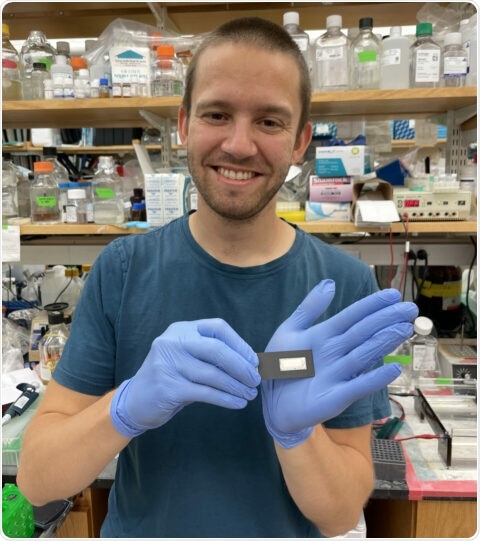Researchers adapted the genetic modification technology CRISPR to analyze antibodies in patient blood samples to pave the way for a new class of medical diagnostics along with a host of other applications.

Karl Barber holding a PICASSO microarray. Image Credit: Karl Barber, Schmidt Science Fellows.
The process involves customizable collections of proteins that are bound to a variant of Cas9, the protein at the heart of CRISPR, which can attach to DNA but not excise it as it would when applied for genetic modification. Once the Cas9-fused proteins are used on a microchip sporting thousands of unique DNA molecules, each protein within the mixture self-assembles to the position on the chip comprising its corresponding DNA sequence.
The scientists named this technique “PICASSO”, short for peptide immobilization by Cas9-mediated self-organization. While applying a blood sample to the PICASSO microarray, the proteins on the microchip that are recognized by patient antibodies can be determined.
The researchers headed by Dr. Stephen Elledge at Harvard Medical School and Brigham and Women’s Hospital, Boston, published the research in the journal Molecular Cell on August 13th, 2021. The study’s first author, Dr. Karl Barber, is a 2018 Schmidt Science Fellow, with most of the work to create the technology taking place during his Fellowship Research Placement in corresponding author Dr. Elledge’s lab.
“Imagine you want to paint a picture on a canvas, but instead of painting in a normal fashion, you mix all of your paints together, splash it on the canvas, and the perfect picture emerges,” stated Dr Barber while describing PICASSO.
With our new technique, you place DNA molecules at defined locations on a surface and each protein from a mixture will then self-assemble to its corresponding DNA sequence, like an automated paint-by-number kit. The resulting DNA-templated protein microarrays allow you to quickly identify antibodies in clinical samples that recognize whatever proteins you are interested in.”
Dr Karl Barber, Study First Author, Harvard Medical School
The scientists elucidated that the technology works to assemble thousands of various proteins, proposing that it could be easily adapted as a broad-spectrum medical diagnostic tool. In the study, they employed the tool to identify antibodies attaching to proteins derived from pathogens, including SARS-CoV-2, from the blood of recovering COVID-19 patients.
Dr. Barber further adds, “In this work, we demonstrated the application of PICASSO for protein studies, creating a tool that we believe could be quickly adapted for medical diagnostics. Our protein self-assembly technique could also be harnessed for the development of new biomaterials and biosensors just by attaching DNA targets to a scaffold and allowing Cas9-linked proteins to bind.”
“One of the most exciting aspects of this work is the demonstration of how CRISPR can be applied in an entirely new setting. Previously, CRISPR has been used primarily for gene editing and the detection of DNA or RNA. PICASSO brings the power of CRISPR into a new realm of protein studies, and the molecular self-assembly strategy we show may assist in developing new research and diagnostic tools,” says Dr. Elledge.
This technology has the potential to be used as a medical diagnostic tool that could, one day, provide doctors with a way to quickly determine the diagnosis and best course of treatment for each individual patient.”
Dr Megan Kenna, Executive Director, Schmidt Science Fellows
“The way that Karl and the research team have brought together fundamental biology with molecular engineering to make this important discovery shows why the interdisciplinarity at the heart of our Fellowship is so critical to advancing science,” remarked Dr. Megan Kenna.
Source:
Journal reference:
Barber, K. W., et al. (2021) CRISPR-based peptide library display and programmable microarray self-assembly for rapid quantitative protein binding assays. Molecular Cell. doi.org/10.1016/j.molcel.2021.07.027.